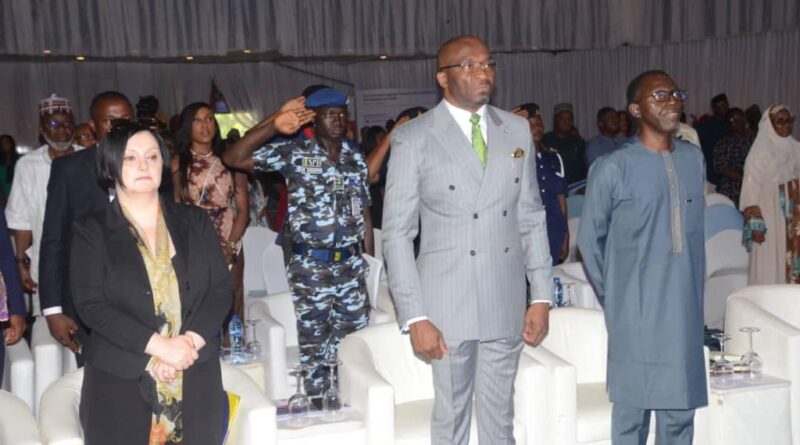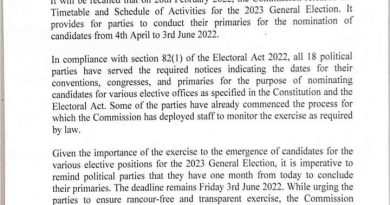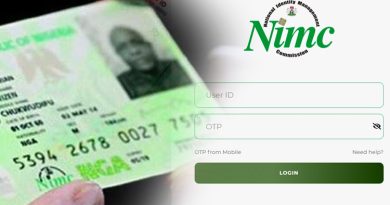Deputy Speaker Calls For Urgent Action To Address Violence Against Women, Girl Child
By Bukar Bolori
The Deputy Speaker of House of Representatives, Rt. Hon. Benjamin Kalu has called for urgent action to address cases of violence against women and girls in the country.
Speaking at a summit organized by the Rule of Law and Anti-Corruption (RoLAC) Programme, the United Nations Development Programme (UNDP), the European Union-United Nations Spotlight Initiative, and the International Institute for Democracy and Electoral Assistance (International IDEA) titled 16 Days of Activism Against Gender-based Violence 2023: Funding and Oversight for VAPPImplementation: A Parliamentary Response to Gender-based Violence, on Friday in Abuja, the Deputy Speaker, said: “The statistics on violence against women and girls in Nigeria are deeply concerning and demand our urgent attention.”
He lamented that approximately 30% of Nigerian women and girls experience physical, emotional, or sexual abuse in their lifetimes, and a distressing 55% of survivors do not receive the support they urgently need.
He noted that the violence takes the form of harmful traditional practices to economic violence, gender-based violence, among others.
Kalu decried that the impact of conflict in certain parts of the country further increases the vulnerability of women and girls, adding that Internally displaced persons, especially women and children, face a heightened risk of violence including abduction, rape, forced labor, and early marriage, as they navigate the challenges of displacement.
He insisted that: “We cannot ignore the stark challenges that persist in our fight against gender-based violence,” stating that: “The VAPP Act, our legislative weapon against gender-based violence, faces implementation and coverage challenges. A culture of silence, stigmatization, and inadequate funding hinder its full potential.”
Kalu added that: “The deliberations at this summit carry profound significance for parliamentarians present, underscoring the need for a collective and resolute response to the pervasive issue of gender-based violence.
“The discussions at this summit hold great significance for the parliamentarians, highlighting the need for a collective and determined response to gender-based violence. These conversations emphasized the urgency to bridge legislative gap with the remaining states of Zamfara, Kano, and Katsina needing to adopt and implement the Violence Against Persons Prohibition (VAPP) Act.”
He insisted that: “Parliamentarians have a crucial role to play in championing the cause of women and girls, advocating for comprehensive legislative frameworks that address the multifaceted challenges posed by gender-based violence. This summit aims to inspire parliamentarians to not only engage in insightful conversations but also to emerge as champions of change, driving legislative reforms that protect the rights and dignity of women and girls across the nation.”
The Deputy Speaker said: “As Parliamentarians, we have the unique role to legislate, allocate funds, and hold the executive branch accountable for the implementation of laws and policies that prevent and address gender-based violence. We must utilize this power to its fullest extent, ensuring that sufficient resources are allocated to support survivors, raise awareness, and provide the necessary training and capacity building for law enforcement agencies and judicial systems.
“Furthermore, parliamentary oversight is crucial in monitoring the implementation of existing laws, identifying gaps, and proposing necessary amendments to strengthen the legal framework. We must also prioritize the establishment of specialized committees or task forces dedicated to gender-based violence, ensuring that these issues are consistently on the parliamentary agenda and that progress is monitored on an ongoing basis. Also, there must be provision for case-tracking of violence for both the survivors and offenders as this will help checkmate the menace of gender-based violence.”
In his intervention, the Resident Representative, United Nations Development Programme (UNDP) Nigeria, Simon Ridley, pointed out that the legislature has an important role to play to ensure that institutions that attend to gender-based violence are properly funded, even as he expressed the commitment of the international organisation to eradicating the menace.
Also in his submission, Head of Programme, Nigeria RoLAC II, International IDEA, Danladi Plang, said the objective of the summit was to sensitize and bring to the knowledge of parliamentarians, the persistent issues that continue to limit access to justice and support services for survivors of Gender-based Violence (GBV) in Nigeria, update parliamentarians on the progress achieved so far in the GBV response sector and recommend actions that must be taken to enhance and sustain progress, including the establishment of a parliamentary mechanism for VAPP implementation monitoring and sensitise parliamentarians to the critical role they play in ensuring appropriate allocation of funding and resources for implementation of the VAPP Act.
On her part, the EU Ambassador and Head of Delegation to Nigeria and ECOWAS, Samuela Isopi lamented that the lack of budgetary provision for the implementation of the VAPP law has not only created additional burden for mandated institutions like the National Agency for the Prohibition of Trafficking in Persons (NAPTIP) but also allowed victims of SGBV to be further traumatised.
“Distinguished senators, honourable members, this is why a parliamentary engagement on this issue is a priority. It is crucial to have appropriations targeted at SGBV, and we count on your support in realising this objective,” she stated.
In her presentation, Project Manager, Access to Justice, RoLAC Phase II Programme, Oluwatoyosi Giwa, disclosed that while 14 states are yet to domesticate the Discrimination Against Persons with Disabilities (Prohibition) Act, 13 have signed into law, 10 assented and two awaiting governors’ assent.
She listed the 14 states yet to pass the legislation to include: Delta, Bayelsa, Osun, Kebbi, Niger, Katsina, Borno, Adamawa, Taraba, Benue, Enugu, Ebonyi, Imo and Akwa Ibom.




